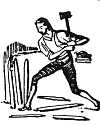|
But, instead of continuing to work only.in the evenings, he began to neglect his regular work, so, as months became years, his family became destitute. After five years of this constant research, he was so poor that he could not buy fuel for his furnace.  One
day when his
family was away, he tore down the fence around the garden for fuel. But
this was not enough to raise the temperature, so he tore up a part of
the floor in the house and then started to use the furniture! The
neighbors were sure he had gone mad and notified the magistrate. When
the officers arrived to take him into protective custody, they did not
find a crazy man but one in ecstasy. "Look, look!" he said. "The enamel
has melted!" One
day when his
family was away, he tore down the fence around the garden for fuel. But
this was not enough to raise the temperature, so he tore up a part of
the floor in the house and then started to use the furniture! The
neighbors were sure he had gone mad and notified the magistrate. When
the officers arrived to take him into protective custody, they did not
find a crazy man but one in ecstasy. "Look, look!" he said. "The enamel
has melted!"Some of the pieces out of this hectic experiment caught the eyes of the Duke de Montmorency, who gave him the job of decorating a chateau. Now he could feed his starving family and he was able to replace the fence, the floor and furniture. He was able also to get a better furnace. Three years after his first experiment, he made another important step in the process. But still he was not satisfied. All of this work had been adding to his experience, but it took another seven years, that is, fifteen in all, until he had worked out a process for making this particular new type of enamelware for which he became famous. |








